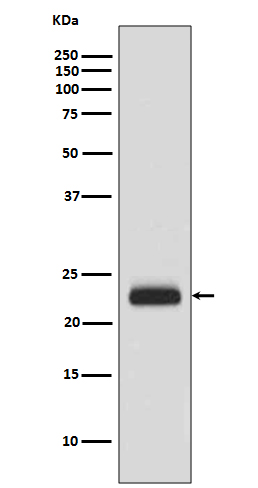RAIDD Antibody
Rabbit mAb
- SPECIFICATION
- CITATIONS
- PROTOCOLS
- BACKGROUND

Application
| WB, IHC, FC, ICC, IP |
|---|---|
| Primary Accession | P78560 |
| Clonality | Monoclonal |
| Other Names | CRADD;MGC9163;RAIDD;Death adaptor molecule RAIDD;Death domain containing protein CRADD; |
| Isotype | Rabbit IgG |
| Host | Rabbit |
| Calculated MW | 22745 Da |
| Dilution | WB 1:500~1:2000 IHC 1:50~1:200 ICC/IF 1:50~1:200 IP 1:50 FC 1:50 |
|---|---|
| Purification | Affinity-chromatography |
| Immunogen | A synthesized peptide derived from human RAIDD |
| Description | The receptor interacting protein RIP is a death domain-containing serine/threonine kinase which associates with FAS or the TNF-R1 binding protein TRADD. RAIDD (RIP-associated ICH-1/Ced-3 homologous protein with a death domain) has been identified as a RIP binding protein that also associates with members of the caspase family, providing a link between activation of the TNF-Rs and the triggering of the cysteine protease cascade. The amino-terminal domain of RAIDD shares significant homology with the prodomain of ICH-1 and mediates the binding of RAIDD to this cysteine protease. |
| Storage Condition and Buffer | Rabbit IgG in phosphate buffered saline , pH 7.4, 150mM NaCl, 0.02% sodium azide and 50% glycerol. Store at +4°C short term. Store at -20°C long term. Avoid freeze / thaw cycle. |
| Name | CRADD |
|---|---|
| Synonyms | RAIDD |
| Function | Adapter protein that associates with PIDD1 and the caspase CASP2 to form the PIDDosome, a complex that activates CASP2 and triggers apoptosis (PubMed:15073321, PubMed:16652156, PubMed:17159900, PubMed:17289572, PubMed:9044836). Also recruits CASP2 to the TNFR-1 signaling complex through its interaction with RIPK1 and TRADD and may play a role in the tumor necrosis factor-mediated signaling pathway (PubMed:8985253). |
| Cellular Location | Cytoplasm {ECO:0000250|UniProtKB:O88843}. Nucleus {ECO:0000250|UniProtKB:O88843} |
| Tissue Location | Constitutively expressed in most tissues, with particularly high expression in adult heart, testis, liver, skeletal muscle, fetal liver and kidney. |

Thousands of laboratories across the world have published research that depended on the performance of antibodies from Abcepta to advance their research. Check out links to articles that cite our products in major peer-reviewed journals, organized by research category.
info@abcepta.com, and receive a free "I Love Antibodies" mug.
Provided below are standard protocols that you may find useful for product applications.
If you have used an Abcepta product and would like to share how it has performed, please click on the "Submit Review" button and provide the requested information. Our staff will examine and post your review and contact you if needed.
If you have any additional inquiries please email technical services at tech@abcepta.com.













 Foundational characteristics of cancer include proliferation, angiogenesis, migration, evasion of apoptosis, and cellular immortality. Find key markers for these cellular processes and antibodies to detect them.
Foundational characteristics of cancer include proliferation, angiogenesis, migration, evasion of apoptosis, and cellular immortality. Find key markers for these cellular processes and antibodies to detect them. The SUMOplot™ Analysis Program predicts and scores sumoylation sites in your protein. SUMOylation is a post-translational modification involved in various cellular processes, such as nuclear-cytosolic transport, transcriptional regulation, apoptosis, protein stability, response to stress, and progression through the cell cycle.
The SUMOplot™ Analysis Program predicts and scores sumoylation sites in your protein. SUMOylation is a post-translational modification involved in various cellular processes, such as nuclear-cytosolic transport, transcriptional regulation, apoptosis, protein stability, response to stress, and progression through the cell cycle. The Autophagy Receptor Motif Plotter predicts and scores autophagy receptor binding sites in your protein. Identifying proteins connected to this pathway is critical to understanding the role of autophagy in physiological as well as pathological processes such as development, differentiation, neurodegenerative diseases, stress, infection, and cancer.
The Autophagy Receptor Motif Plotter predicts and scores autophagy receptor binding sites in your protein. Identifying proteins connected to this pathway is critical to understanding the role of autophagy in physiological as well as pathological processes such as development, differentiation, neurodegenerative diseases, stress, infection, and cancer.


